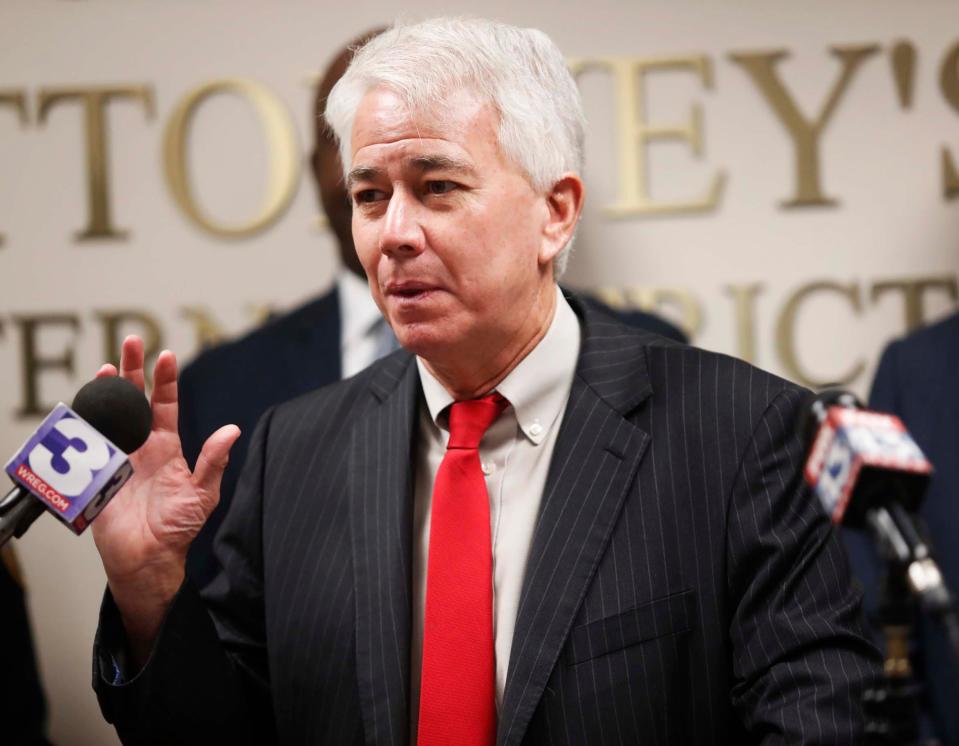Tennessee appeals court reverses ruling that let Courtney Anderson out of prison

The Tennessee Criminal Court of Appeals has reversed a Shelby County Criminal Court judge's ruling that freed a man by shortening his 160-year sentence for a series of non-violent offenses.
The ruling, handed down Oct. 18, upheld the initial sentence for Courtney Anderson, who had served 25 years when he was released in December. He was convicted in the late 1990s for multiple counts of felony theft, felony forgery and a single count of misdemeanor possession of a handgun in a public space.
At his sentencing, then-Shelby County Criminal Court Judge Joseph Dailey sentenced Anderson to the maximum time for each count, which, following a few modifications, was ultimately set at 162 years, 11 months and 29 days.
In December, Shelby County Criminal Court Judge Paula Skahan shortened Anderson's sentence to the 25 years he had already served. During her ruling, the appeals court quoted her as saying the sentence applied by Dailey was "way too much time."
The appeal was filed by the Tennessee Office of the Attorney General after Skahan ruled to reduce Anderson's sentence. They argued that the Shelby County Criminal Court lacked jurisdiction to re-open the post-conviction proceedings since the one-year statute of limitations had expired, that there was not a constitutional violation pleaded or found in the filing and that the sentence reduction was "essentially commuting the petitioner's sentence," which is a power only the Tennessee governor has.

The appeals court agreed with all of those arguments, saying that Skahan's ruling to alter Anderson's sentence amounted "to nothing more than an improper attempt to commute the petitioner's sentence under the guise of a motion to re-open" his post-conviction proceedings.
Anderson's attorneys argued that the statute of limitations could be overcome because he had been diligently pursuing his rights, and that the constitutional violation came when an amendment passed in 2016 that made some of his past convictions misdemeanors instead of felonies.
The criminal court of appeals disagreed with those arguments, saying a motion to re-open his post-conviction proceedings should have been filed in 2017 after the amendment went into effect.
"The petitioner, relying on the 2016 [Public Safety Act], contends that three of his prior felony theft convictions are now considered misdemeanors, and, therefore, he is entitled to relief," Tennessee Criminal Court of Appeals Judge J. Ross Dyer wrote in the ruling. "However, the 2016 Act took effect on January 1, 2017, and the petitioner did not file the instant petition until December 5, 2022, over five years after the effective date of the statute. Clearly, such a delay cannot be described as diligent pursuit of one’s rights. The petitioner’s claim and the trial court’s finding that the petitioner has been diligently pursuing his rights is in no way supported by the record."
Skahan told The Commercial Appeal Tuesday morning that she was aware of the statute of limitations issue, which was why she spoke with prosecutors in the courtroom "about if there was something we can do."

"One of the prosecutors came up with that," Skahan said. "The prosecutor wrote it, and I signed off on it. It was just something creative that we tried to do to get a man out of prison."
Following the ruling, in December, Skahan told The CA the length of time Anderson was sentenced to serve "made me sick to my stomach."
They also ruled that since the amendment did not invalidate his prior convictions, only making them misdemeanors, Anderson's counsel's argument that the sentence imposed by Dailey was a constitutional violation did not take place.
The appeals court went on to say that Skahan's ruling was "broad" and did not make adequate findings to grant the post-conviction relief Anderson sought.
"In its order granting relief, the trial court failed to make any findings sufficient to satisfy the statutory requirements," Dyer wrote. "Instead, the trial court makes overly broad statements such as the petitioner 'has articulated the required statutory grounds to re-open the post-conviction.' The trial court makes no factual finding as to what the petitioner has articulated and even fails to cite the statute the trial court was relying on. Additionally, rather than articulate and explain the constitutional basis for its decision, the trial court broadly states it is granting relief because 'this court believes the original sentence to be excessive and a reduction is necessary.' In short, as argued by the state, the trial court failed to make any of the required constitutional findings or analysis necessary to grant the relief."

In response to the reversal by the appeals court, Shelby County District Attorney Steve Mulroy stood by his earlier statements, calling the original sentence excessive for a series of non-violent offenses.
"The 162-year sentence for a string of non-violent offenses was clearly excessive," Mulroy said in an email statement. "Mr. Anderson served 25 years, which was enough. It's regrettable that the AG prioritized using scarce legal resources to reinstate on appeal a clearly excessive sentence. I hope the governor will consider clemency."
Appeals court voices concern over post-conviction proceeding
The Tennessee Criminal Court of Appeals also expressed concern with the way that the post-conviction case was handled by the DA’s office, Anderson’s counsel and Skahan, citing court transcripts that they said pointed to Skahan having decided the case outcome prior to hearing arguments.
"While not expressly stated, one can easily infer from the transcript that the trial court in this matter not only predetermined the outcome prior to conducting a hearing on the motion, but directed the actions of the parties to reach a desired and specific result," Dyer wrote at the end of the ruling.
The ruling from the appeals court quotes Skahan as saying, "I am certainly on board. I was hopeful this would be able to happen as soon as I looked at it. Seriously [his sentence] is so outrageous."
The appeals court also voiced concern about conversations between an assistant district attorney and Skahan that happened without Anderson present where the appeals court said Skahan was "directing the ADA 'we've got to try and do something if we can."
Criminal justice news: DOJ indicts 21 in Memphis in targeted gun-crime operation, over 90 guns recovered
Comments Skahan made during her ruling about former Shelby County District Attorney Amy Weirich and Dailey were also scrutinized by the appeals court. Weirich was the prosecutor in Anderson's trial.
"Here, the trial court took time during her oral ruling to unnecessarily and without provocation or proof, call into question the character of members of the judicial system and, indirectly, the system as a whole," Dyer wrote. "The trial court stated, 'So, it was all timing with Amy Weirich out of the office and the right judge who might be willing to do something to help you, it was all timing. It's just the way I guess God looking down on you... But that's too much time, obviously, way too much time, and I know how Judge Daily was. I — believe me, I practiced in there. It was not fun. They just piled up on people."
Skahan said she should have been more aware when she criticized the former DA and judge when she was in court that day.
"I did something from the heart, and spoke from the heart," she said. "That got me in trouble from an appellate judge, who is also our go-to for ethical issues, and I got chastised for it. I can't say anything on the record to criticize other judges, and I should have been more aware of that when I said those things."
The attorney's general office did not respond to a request for comment on the ruling at the time of publication.
Lucas Finton is a criminal justice reporter with The Commercial Appeal. He can be reached at Lucas.Finton@commercialappeal.com and followed on Twitter @LucasFinton.
This article originally appeared on Memphis Commercial Appeal: Tennessee appeals court reverses ruling reducing Courtney Anderson sentence

